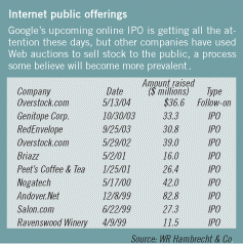Google's upcoming initial public offering will be a high-water mark for the Internet in corporate capital-raising. The wildly popular Web search engine will require its 30 underwriting firms to accept bids online from institutional and individual investors and produce a clearing price at which all available shares will be sold. By moving price discovery from the underwriters to buyers and allowing a wider array of investors to participate, the so-called Dutch auction should maximize Google's proceeds and limit its cost of raising capital.
It's no wonder, then, that everyone's going gaga for Google. But Internet technology has been penetrating securities underwriting to a greater degree than many investors realize.
For starters, there already have been several other online equity deals. San Francisco investment bank WR Hambrecht & Co. conducted the first online Dutch auction IPO five years ago, for Ravenswood Winery. (The company's shares climbed 67 percent in two years before Constellation Brands acquired it at a 181 percent premium to its IPO price.) When the tech-stock bubble burst soon after, demand slackened. But as the IPO market continues to revive, more companies have been conducting Internet auctions, including online retailer RedEnvelope in September and biotechnology concern Genitope Corp. in October (see table). Both issues have declined thus far in the aftermarket. Overstock.com, a liquidation retailer, did the first online follow-on stock offering in May through Hambrecht, which also will be among Google's underwriters.
Bond underwriting has gone online to a much greater degree. Pittsburgh-based Grant Street Group, operator of a site called MuniAuction, has raised more than $3.3 trillion in about 5,500 auctions for state and local governments since 1997. And blue-chip corporations such as DaimlerChrysler, Dow Chemical Co. and General Electric Co. conduct ongoing Web offerings of medium-term notes to individual investors, using technology developed by Chicago-based Incapital.
Internet technology is also quietly streamlining the syndication of large stock offerings. On June 3, Citigroup and Merrill Lynch & Co. used an automated system to manage a $489 million IPO for British bicycle-store chain Halfords. The technology, developed by financial software company I-Deal (of which Citi and Merrill are minority owners), allowed the underwriting syndicate to build a book of orders from investors in multiple European markets in real time, eliminating duplicative orders from common clients and agreeing on allocations. Ordinarily, these tasks require a combination of e-mails, phone calls and faxes that can have bankers working into the wee hours on the night a deal prices.
"It cuts hours and hours off the indication and allocation process and really lowers the risk of making errors," says Frank LaQuinta, co-head of capital markets at I-Deal.
But when it comes to sexy and lucrative stock offerings, Wall Street has been reluctant to take the next step -- letting investors control pricing and buy into deals online. And many companies, wary of handing over something as important and closely scrutinized as their stock price to a relatively untested technology, may continue to opt for traditional methods. But investment banks may not be able to hold out forever.
"The use of the Internet, because it promotes efficiency of pricing and breadth of distribution, is inevitably going to be widespread," says Bruce Mann, a partner at law firm Morrison & Foerster who worked on Overstock.com's follow-on.
Indeed, if more companies join Google in deciding that greater automation and democratization of offerings will attract more investors and reduce their cost of capital, the Street will have to go along.
In fact, there may be very little keeping them from cutting out underwriters entirely. "Our technology could be used by an issuer to run his or her own deal," says I-Deal's LaQuinta.
That certainly would give new meaning to the "tombstones" that commemorate completed deals.






